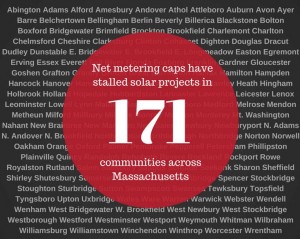 This week Baker Administration announced new solar policy legislation in the wake of Speaker DeLeo sending S1979 off to Ways & Means where it is likely to strip out the Senate Net Metering amendment and focus on climate change issues. Titled “AN ACT RELATIVE TO A LONG-TERM, SUSTAINABLE SOLAR INDUSTRY” (click here) this proposal will lift the Net Meter Cap until 1600 mega-watts of solar is achieved, essentially another 2 to 3%, (keeping solar PV below 10% of electric use) after which the Republican appointed Dept. of Public Utilities (DPU) will determine future capacity. The multi-billion dollar question is at what price?
This week Baker Administration announced new solar policy legislation in the wake of Speaker DeLeo sending S1979 off to Ways & Means where it is likely to strip out the Senate Net Metering amendment and focus on climate change issues. Titled “AN ACT RELATIVE TO A LONG-TERM, SUSTAINABLE SOLAR INDUSTRY” (click here) this proposal will lift the Net Meter Cap until 1600 mega-watts of solar is achieved, essentially another 2 to 3%, (keeping solar PV below 10% of electric use) after which the Republican appointed Dept. of Public Utilities (DPU) will determine future capacity. The multi-billion dollar question is at what price?
This Legislation is full of generalizations and unknowns, written intentionally to confuse even the most knowledgeable solar stakeholder. Here are a few examples:
- DPU to design a solar program that is “stable, equitable, and self-sustaining solar market at a reasonable cost to ratepayers. (Yet we still give fossil fuels subsidies and incentives like new pipelines at the cost to ratepayers just mention one).
- DPU will “ensure that the costs of the program are shared collectively among all ratepayers of the distribution companies” (Minimum Bill?).
- DPU “may establish a separate incentive program for non-solar photovoltaic generation units eligible under the renewable portfolio standard.” (So imported gas and hydro can kill future solar and wind?)
The Net Metering of today that is the retail basic rate supply + distribution (around .18 per kW) will become “Market-based net metering credit” the “average monthly energy clearing price in the ISO-NE zone in which the net metering facility is located” or the cheapest wholesale rate … so watch your net meter value drop to .03 to .04 per kW, unless you install muni, community, or low income, then they “shall receive a credit equal to the basic service kilowatt-hour charge in the ISO-NE load zone” or about .07 to .09. So while it is true Net Metering will be uncapped (up to 1600 MW), all of solar PV will see a dramatic loss in Net Meter revenue as there is no provision to grandfather existing systems … and if you have a small 1 to 5 kW system, the new minimum bill may actually cost you to have installed solar. Or as the utilities would say, make solar self-sustaining.
Perhaps the biggest unknown is the future of incentives like RECs and SRECs. All that is said is that the DPU “shall set forth provisions in its regulations specifying that the program implemented in accordance with paragraph (a), which reads: “take into account other incentives, credits, or revenue available to developers and owners of different classes of projects.” Try taking that to the bank.
